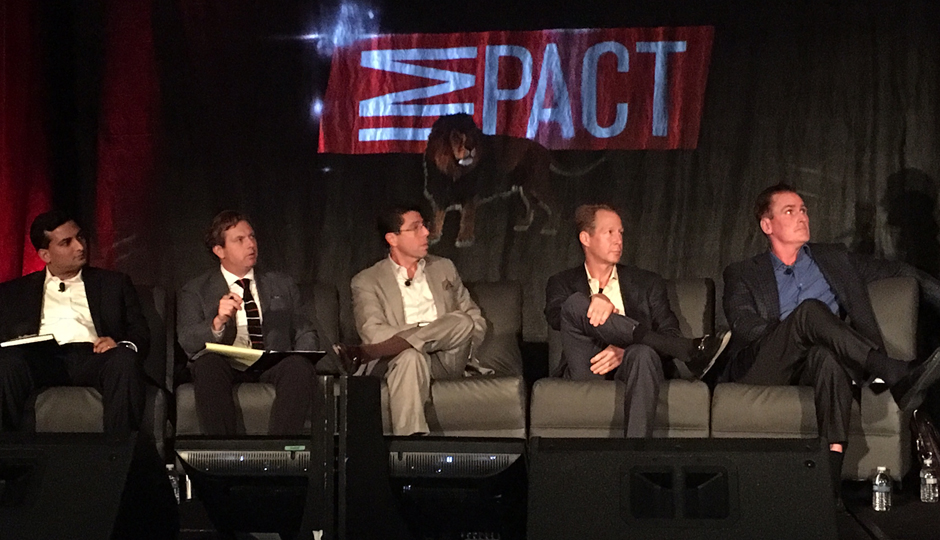Philly “Shark Tank” Leads to $550,000 in Startup Funding

Welcome to The Lion’s Den with investors (from left) Jonathan Brassington, Michael Wells, Dr. Robert Corrato, Walter (Buck) Buckley and Michael Hagan. (Photo by Jared Shelly)
It wasn’t quite Shark Tank, but a similarly run contest in Philly led to two startups receiving a combined $550,000 in investment capital.
Part of the IMPACT 2015 Capital Conference, the “Lion’s Den” featured five investors prepared to trade their own cash for a percentage of a startup company. Forty early-stage, health care and technology companies presented their ideas throughout the day on Wednesday — and three were chosen to present directly to the Lion’s during a packed late afternoon session.
Meet the Lions:
- Michael Hagan, former CEO of NutriSystem.
- Jonathan Brassington, CEO and co-founder of LiquidHub.
- Walter (Buck) Buckley, co-founder, CEO and chairman of Actua.
- Dr. Robert Corrato, co-founder and managing partner of Devon Hill Capital Partners.
- Michael Wells, managing director of Princeton Biopharma Capital Partners.
Here’s a look at how all three companies did:
Fitly — maker of the SmartPlate.
After his father suffered through triple-bypass surgery, Anthony Ortiz dedicated himself to finding a way to help people eat better. So he created the SmartPlate, which analyzes your food and offers calorie counts and other nutritional information. It uses three digital cameras and advanced image recognition and weight sensors to identify the food. Then it calculates how much protein, fat, carbs and sugar you’re about to consume. Plus it’s microwavable, dishwasher safe and counts Olympic champion Jackie Joyner-Kersee as one of its co-founders.
So far, it’s sold 1,500 units in 17 countries and has $150,000 in pre-orders, Ortiz said. The business is earning $10,000 to $15,000 in revenue monthly.
“Poor nutrition is a global pandemic,” Ortiz said to the Lions, noting that the company is launching pilot study with the Children’s Hospital of Philadelphia in Q2 of 2016.
“I eat out seven nights per week. How do I take smart plate to Capital Grille?” asked Brassington. Ortiz responded by saying that smaller plates and bowls will soon become available, and that the company has a database of nutrition information from thousands of restaurants.
Ortiz was also grilled about the abundance of smartphone apps that only require a picture of the food to count calories. But he said they’re only 70 percent accurate, where SmartPlate is 100 percent accurate, leading to better weight loss gains.) The Lions also wondered about customer-acquisition costs because “unit economics don’t offer good enough models” said Hagan.
Ortiz was offering $250,000 for a 5 percent stake in the company, a $6.5 million pre-money valuation. But three Lions (Buckley, Wells and Corrato) offered a combined $150,000 at a valuation of $2.5 million. Ortiz rejected it outright because the business raised money just eight months prior at a $5.5 million valuation.
“More entrepreneurs need to do that — stick to guns and defend what they worked so hard to build. Also, defend what your friends and family and previous investors have worked so hard to build with you,” he said in an interview afterward. “It would have been an insult to them had I accepted a valuation that low.”
PhotoSonix Medical — a treatment for severe acne.
Ultrasound industry expert Mark Schafer says he’s developed a treatment for severe acne that uses no drugs and can significantly reduce scaring and red marks in three weeks. Called Photosonix, it’s a handheld device that uses light and ultrasound energy to treat bacterial infections that cause acne. Expected to launch in 2018, the company has already raised $755,000 and closed a $330,000 round of convertaible debt.
“There are a lot of light therapy methods out there, what makes your light better than the others?” asked Wells.
“We picked exactly the right wavelengths,” countered Schafer. “The kicker is the ultrasound energy. It activates the bacteria – revving up its metabolism.” That makes it light sensitive thus reducing the acne spots.
But the big drawback for the Lions was Schafer’s go-to-market strategy of seeking FDA approval then selling first to dermatologists — rather than just selling it over-the-counter. Hagan even noted that Philly’s own no!no! went that route with its successful hair-removal products.
Still, the product got a lot of Lion interest. “I’m in for 50,000. I had terrible case of acne growing up,” said Buckley. The other Lions agreed, and PhotoSonix walked away with $350,000 and investments from all five Lions.
PurpleCloud Technologies — a hotel software platform.
Adria Bagdonavicius has been wondering why hotels have been using outdated equipment to maintain inventory, report workflow problems and examine operational efficiency. So the recent Drexel grad created PurpleCloud Technologies which offers Cielo, a hotel software platform that collects data from staff members, and helps analyzes trends about the business. She says it can lead to average cost savings of $137,000 on average per year per hotel.
“They’re using 1980s DOS-based computer systems, clip boards and radios — and staff members are running around the hotel frantically,” said Bagdonavicius, who worked at the Marriott near the Philadelphia airport for several years.
Armed with Marriot CIO Carl Wilson as an advisor, as well as a pilot program at the Rittenhouse Hotel, PurpleCloud Technologies projects that, by 2019, it will be in 1,312 hotels with revenue of $19 million.
In the end, four Lions committed a combined $200,000 in funding.
Like what you’re reading? Stay in touch with BizPhilly — here’s how:
- Follow BizPhilly on Twitter and follow editor Jared Shelly here.
- Get the BizPhilly Newsletter
- Like BizPhilly on Facebook
- Check out the BizPhilly homepage


